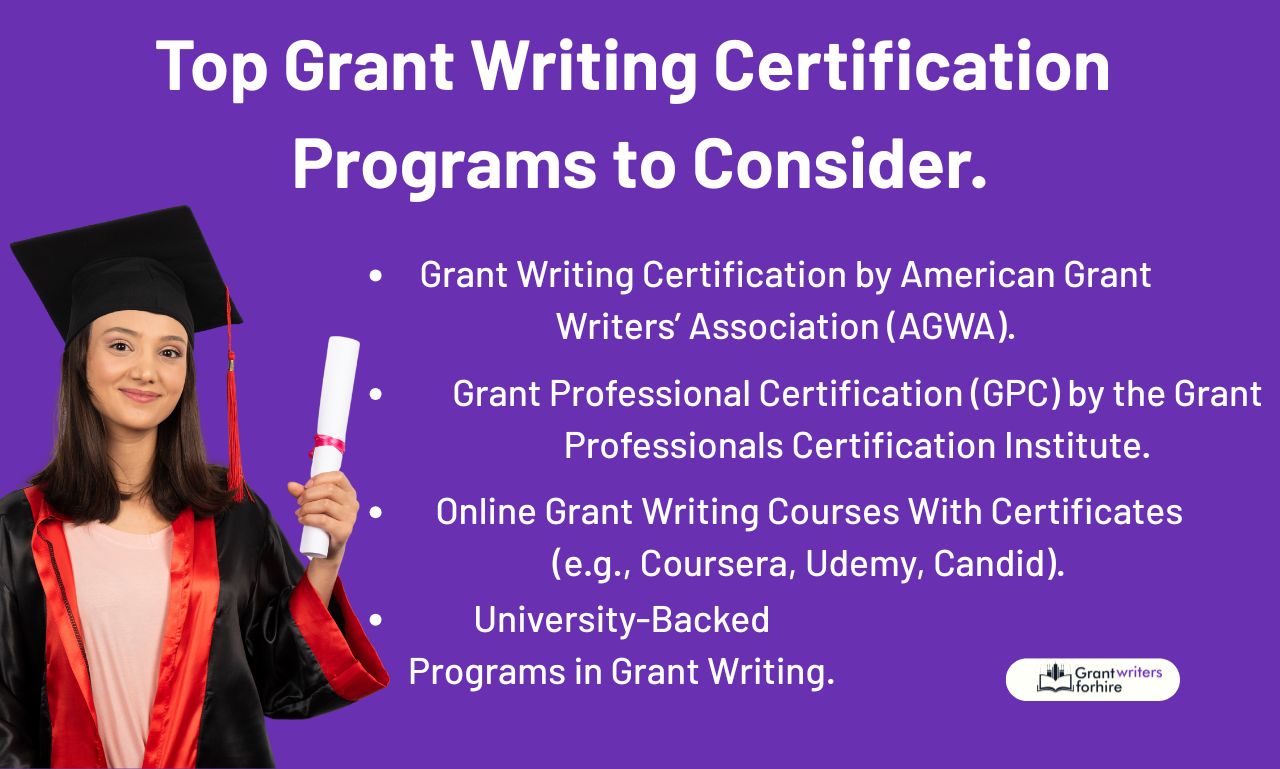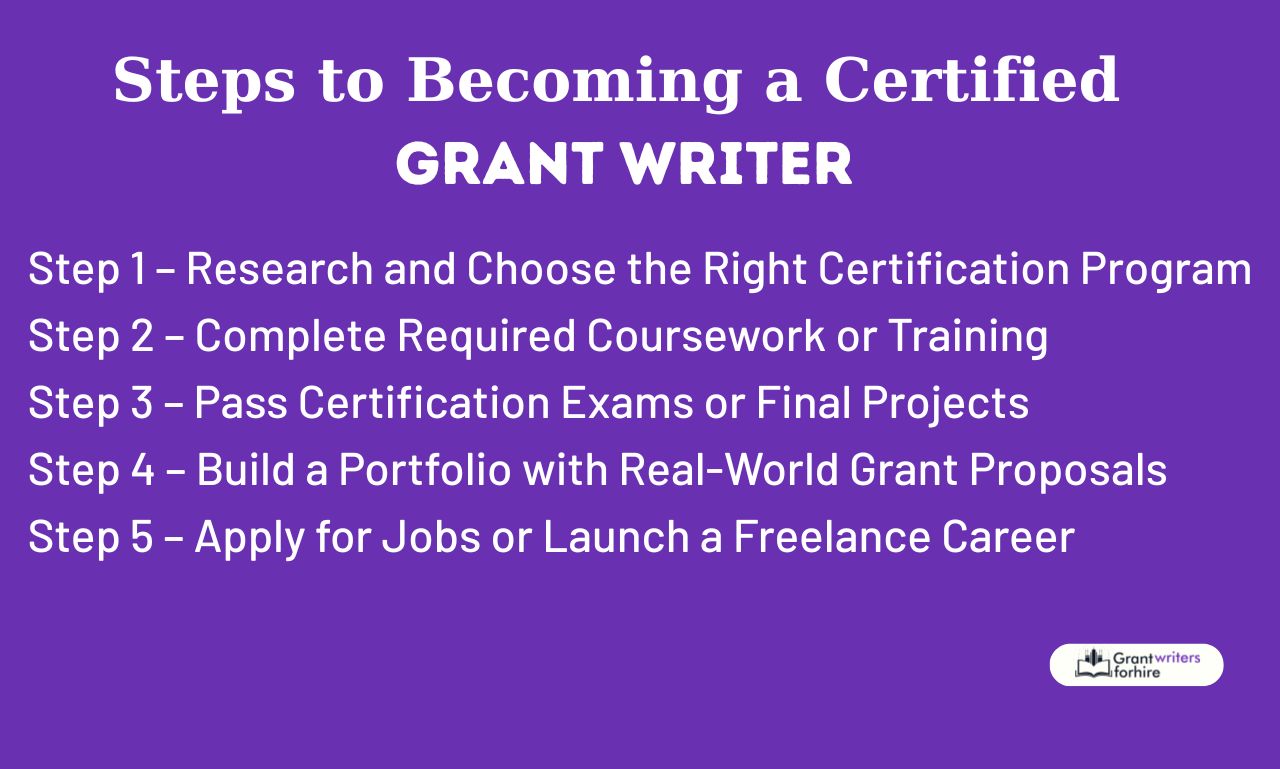How to Become a Certified Grant Writer: A Step-by-Step Career Guide
Becoming a certified grant writer starts with training that teaches you how to write clear proposals and follow funder guidelines. These programs, which can be online or in-person, give you a certificate that shows you have learned the needed skills.

A grant writer is someone who helps people or groups ask for money for important projects by writing proposals that explain the project’s goals and needs. Their role includes finding the right funders, gathering information, and making sure the proposal is correct, clear, and on time.
Grant writers often work with a team and may also handle follow-up tasks like reports. Many organizations hire grant writers, including schools, hospitals, nonprofits, art groups, and even some businesses. These writers help get funding for projects in health, education, community programs, and more.
There are grant writers who work freelance, choosing their clients and hours, while others work full-time in-house with steady pay and team support. Freelancing offers freedom but requires finding your own clients, while in-house work provides structure and job security. Both options need strong writing, research, and communication skills to help others reach their goals.
Do You Need Certification to Be a Grant Writer?
You do not need a certification to start working as a grant writer, but it can be helpful. Some people learn grant writing through experience, while others take classes to learn faster and become more confident. A certificate shows you have completed training and understand how to write good proposals.
Some employers may prefer certified writers, but many care more about your writing skills and success rate. Being certified does not mean you are better, but it may help you stand out. Whether or not you choose to get certified depends on your goals, experience, and the kind of job you want. It is important to look at both the benefits and limits of certification before deciding.
Is Certification Required by Employers?
Most employers do not require a grant writing certificate, but some may ask for it as proof of training. In many cases, they look at your past work, writing skills, and understanding of grants. If you have written strong proposals before, that may matter more than having a certificate.
However, for people just starting out, certification can help show they are serious and ready to learn. Some nonprofit groups or agencies may include certification as a preferred skill in their job posts. Generally, while not always needed, it can give you an extra edge when applying.
Difference Between Certified and Non-Certified Grant Writers
The main difference between certified and non-certified grant writers is training. Certified writers have taken a course that teaches them the rules, structure, and steps of writing grant proposals.
Non-certified writers may have learned by doing the job or through other work experiences. Both can be good at writing grants, but certified writers have proof they were trained. Employers may see certification as a sign of trust, but they also want results. A non-certified writer with a strong success record may still be hired over a certified one, what matters most is the quality of your work.
Pros and Cons of Getting Certified
Getting certified has both good and bad sides. One benefit is that it helps new writers learn faster and feel more prepared. Certification can also make your resume stronger and help you find jobs more easily. It shows you took time to study and improve your skills.
On the other hand, certification can cost money and take time to complete. Some programs may not offer real value, so you have to choose carefully. Also, having a certificate does not guarantee you will get a job. It is just one of many things that can help you grow as a grant writer.
Top Grant Writing Certification Programs to Consider

To learn grant writing and earn a certificate, there are several good programs to choose from. Some are offered by well known groups, and others come from trusted schools or online websites. These programs teach you how to write clear proposals, follow funder rules, and understand the full grant process. The right program can help you feel more prepared and show others you have been trained. It is important to compare the cost, how long the course takes, and if it is online or in person. Picking the right one depends on your time, budget, and learning needs. Below is a description of some of the certification programs;
Grant Writing Certification by American Grant Writers’ Association (AGWA)
The AGWA certification is one of the most popular choices for new grant writers. It includes a training course and an exam that you must pass to earn the certificate. The course teaches important parts of grant writing, such as writing letters, proposals, and budgets. It is mostly offered online and is meant to be completed in a few weeks. The AGWA is known for being detailed and focused on helping writers build real-world skills. Many people take this program to improve their chances of getting hired.
Grant Professional Certification (GPC) by the Grant Professionals Certification Institute
The GPC certification is for writers with some experience who want to take their skills to the next level. This is not a training course but a test that shows you are already skilled in grant writing. To take the test, you need to meet certain work experience and education rules. It covers areas like writing, ethics, and finding funders. This certificate is well respected and can help you get better jobs or freelance clients. The GPC shows you are a professional and serious about your work.
Online Grant Writing Courses With Certificates (e.g., Coursera, Udemy, Candid)
Many people choose online courses like Coursera, Udemy, or Candid because they are flexible and easy to access. These platforms offer beginner-friendly lessons you can take at your own pace. Some courses are made by colleges or experts and give you a certificate when you finish. The topics usually cover writing, budgets, and funder research. They are great for learning from home and are often more affordable than other options. This makes them a popular choice for new or busy learners.
University-Backed Programs in Grant Writing
Some colleges and universities also offer grant writing programs. These are usually non-degree courses and may be part of their continuing education departments. The classes are led by experienced teachers and follow a school-style schedule. They often include writing practice, group work, and final projects. These programs give a certificate at the end and may carry more value because they are linked to trusted schools. They are a good option if you want a more guided, classroom feel.
Cost, Duration, and Delivery Format Comparison
Grant writing programs can vary in price, time, and how they are taught. Some courses cost under $100, while others may be $1,000 or more. Online programs often let you start anytime and learn at your own speed. University or live classes usually have set dates and may take several weeks. Some programs offer live classes by video, while others are fully self-paced with readings and videos. It is important to choose one that fits your schedule, budget, and learning style. Comparing all these parts will help you find the best match for your needs.
Educational Background and Skills You Need to Become a Grant Writer
To become a grant writer, you do not need a specific degree, but having the right education and skills can make your job easier. Most grant writers study subjects like English, communications, or nonprofit management. These areas help build strong writing and reading skills. In addition to school learning, grant writers also need real-world skills like research and working with budgets. They also use special tools to help them write better and find the right funders. Learning both the basics and the tools helps you write stronger proposals and be more successful. Let us see more details below;
Recommended Degrees and Academic Paths
While there is no required degree to become a grant writer, certain subjects are more helpful than others. Degrees in English, journalism, communications, public administration, or nonprofit management teach important writing and planning skills. Some grant writers also study business or social work, depending on the types of groups they want to work with. A degree can help you understand how organizations run and how to speak clearly in writing. Even without a degree, short courses and writing experience can also prepare you well. Education helps, but your writing results matter most.
Core Skills: Writing, Research, Budgeting, and Compliance
Good grant writers have several important skills. Writing is key, because you must explain clearly why a project should get money. Research helps you find the right funders and understand their rules. Budgeting is important too, you must explain how the money will be used. You also need to follow all the rules from funders, which is called compliance. Being organized and careful helps you manage all of this. These skills work together to make your proposal strong and easy to understand.
Tools Grant Writers Use (e.g., Grammarly, Instrumental, Foundation Directory)
Grant writers use helpful tools to do their work better and faster. Grammarly checks your writing for mistakes and helps you sound more clear and professional. Instrumental is also a tool that helps find funders and keep track of deadlines. The Foundation Directory on the other hand is a database where writers search for grants offered by different organizations. These tools save time and improve your chances of writing a strong proposal. Using the right tools can make your job easier and help you stay on track with your work.
Steps to Becoming a Certified Grant Writer

Becoming a certified grant writer involves following a few clear steps that prepare you for professional success. This process includes selecting a reputable certification program, completing the necessary coursework, and demonstrating your abilities through exams or final projects. After certification, building a portfolio with real-world examples and applying for employment or freelance opportunities will help establish your career. Each step is essential for gaining the knowledge, experience, and credibility needed in the grant writing field. These steps are;
Step 1 – Research and Choose the Right Certification Program
The first step is to carefully research and select a suitable grant writing certification program. Consider factors such as course content, duration, cost, and delivery method. Some programs are entirely online, while others may offer live instruction. Choose a program that aligns with your learning style, schedule, and professional goals. A strong program should provide training in proposal writing, funding research, and grant compliance.
Step 2 – Complete Required Coursework or Training
Once enrolled, it is important to complete all assigned coursework and training sessions. These programs typically cover the fundamentals of grant writing, including how to draft compelling proposals, prepare budgets, and meet funder requirements. Active participation and thorough understanding of the course material are essential for building a solid foundation in grant writing.
Step 3 – Pass Certification Exams or Final Projects
Most certification programs require candidates to either pass a final exam or submit a completed grant proposal. This step is designed to assess your understanding of the material and your ability to apply what you have learned. Successfully passing the evaluation will earn you a certificate and demonstrate your readiness to enter the field as a professional grant writer.
Step 4 – Build a Portfolio with Real-World Grant Proposals
Once certified, you should begin developing a professional portfolio that includes samples of your grant writing work. This may include proposals completed during training, internships, or volunteer projects. A well organized portfolio showcases your skills to potential employers or clients and serves as proof of your ability to write effective grant proposals.
Step 5 – Apply for Jobs or Launch a Freelance Career
With your certification and portfolio in hand, you can start applying for grant writing positions or begin offering freelance services. Opportunities exist in a variety of sectors, including education, healthcare, nonprofit organizations, and the arts. Freelancers should consider creating an online presence to attract clients. Continued learning and experience will further enhance your expertise and reputation in the field.
How Much Do Certified Grant Writers Earn?
The income of certified grant writers can vary depending on how they work and where they live. Some grant writers work full-time for one organization, while others choose to freelance and work for different clients. Pay can also change based on your experience, the type of projects you do, and if you work in a busy city or a smaller town. Being certified may help you get more job offers and possibly higher pay. Understanding these differences can help you plan your career better and reach your earning goals.
Freelance vs Full-Time Salary Ranges
Freelance grant writers usually charge by the hour or by project. Their income depends on how many clients they have and what kind of work they do. Some make around $25 to $100 per hour. Full-time grant writers often earn a steady salary, which can range from $45,000 to $75,000 per year, depending on the job. Freelancers may earn more with experience but also need to find their own clients.
Factors That Influence Income (Experience, Industry, Location)
Several things can affect how much a grant writer earns. Writers with more years of experience often get paid more. The industry you work in also matters, healthcare or government jobs may pay more than smaller nonprofit jobs. Location plays a role too, big cities usually offer higher pay than small towns. These factors together help decide your earning potential.
Certification Impact on Job Opportunities and Pay
Having a grant writing certificate can make you stand out to employers. It shows that you have training and understand how to write strong proposals. This can help you get more job offers or be chosen over someone without a certificate. While certification does not guarantee high pay, it may lead to better opportunities and career growth. It can also help you start faster if you are new to the field.
Career Opportunities After Grant Writing Certification
Earning a grant writing certification can lead to many job opportunities across different fields. It shows employers that you have the skills to write strong proposals and understand the funding process. Certified grant writers are needed in places like nonprofits, schools, hospitals, and government agencies.
You can work full-time, part-time, or even take freelance projects from home. With this certification, you can apply for roles that help organizations get the funding they need to grow and serve others. It gives you more career options and helps you stand out in the job market. Some of these career options include;
Common Job Titles: Grant Writer, Development Coordinator, Proposal Manager
After certification, you can apply for different roles such as grant writer, development coordinator, or proposal manager. A grant writer focuses on writing funding proposals. A development coordinator helps plan how to raise money, including through grants while a proposal manager leads teams to prepare and send large grant applications. Each role plays a part in helping organizations get the money they need.
Industries Hiring Certified Grant Writers (Nonprofits, Education, Healthcare, Government)
Many industries need certified grant writers. Nonprofit groups hire them to support community projects. Schools and colleges need writers to get funds for education programs. Hospitals use them to fund patient care and medical research. Government offices hire grant writers to win funding for local projects. These industries trust certified professionals to write clearly and follow all grant rules.
Remote and Freelance Opportunities for Certified Professionals
Certified grant writers can also work from home or take freelance jobs. This gives you freedom to choose your hours and clients. Many small nonprofits or businesses need grant help but can not hire full-time staff. Freelancers fill that gap. Online job platforms and remote work tools make it easier to find and manage freelance work. This path is great for people who like flexible schedules and working on different types of projects.
Maintaining and Renewing Your Certification
After getting your grant writing certification, you need to keep it active by meeting certain rules. This helps you stay current with new skills, tools, and funding changes. Many programs ask you to continue learning through extra courses or training every few years. Being part of professional groups and staying informed about new funding trends also helps you grow in your career. Keeping your certification updated shows you are serious and ready for future opportunities. Here are some useful tips:
Continuing Education Requirements
To keep your certification valid, you may need to complete extra learning hours. This could include webinars, online classes, or in-person workshops. These learning sessions teach updates in grant writing, proposal rules, and new tools. They help you stay sharp and improve your work over time. Most programs tell you how many hours or credits you need before renewal.
Membership in Professional Associations (GPA, AFP)
Joining groups like the Grant Professionals Association (GPA) or the Association of Fundraising Professionals (AFP) is also helpful. These groups offer training, resources, and networking with other writers. They often share job leads, writing tips, and news about funding. Membership shows you are serious about growing in your field. It also gives you access to events and learning tools.
Staying Updated on Funding Trends and Grant Regulations
Rules for grants can change often, and it is important to stay informed. Following updates on funding trends and government changes helps you write better proposals. You can learn through newsletters, training, or professional groups. Knowing the latest rules helps avoid mistakes and improve your success rate. Being up to date makes you more trusted by clients and employers.
Grant Writing Certification FAQs
How long does it take to become a certified grant writer?
Most programs take between a few weeks to a few months to complete. The time depends on how many hours you study each week and if the course is self-paced or has set deadlines. Some short courses can be done in under 40 hours, while longer ones may take several months. Choosing the right speed depends on your schedule and learning style.
What’s the difference between a course and a certification?
A course teaches you skills but may not give you a full certification. Certification programs often include training, a final test or project, and an official certificate when you pass. Courses can help build your knowledge, while certification proves you are ready for professional work. Some people take a course first, then complete certification later.
Can I become a certified grant writer without a degree?
Yes, you can become certified without a college degree. Most programs do not require one, though having a degree may help in certain jobs. What matters most is your writing skills, understanding of grants, and ability to follow instructions. Many successful grant writers do not have a formal degree in writing or nonprofit work.
Are online certifications recognized by employers?
Many online certifications are accepted by employers, especially if they come from trusted schools or groups. It is important to choose programs with good reviews and clear learning goals. Online learning is common today, and many employers care more about your skills and past work than where you studied. A strong portfolio and clear writing can matter even more.

